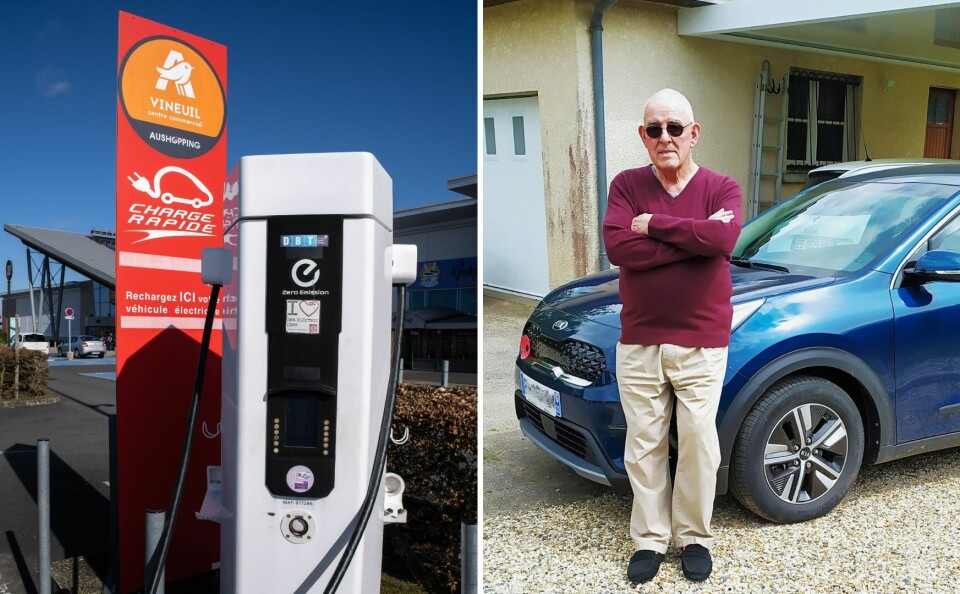-
My tips for bird nesting season in south-west France
Some species begin building nests as early as February, including collared doves, mistle thrushes and song thrushes
-
What I miss about France after moving back to UK
Columnist Gillian Harvey, who returned to the UK in 2024, explains what she misses – and what she has gained in the process
-
Auvergne region is neglected by government
Government agencies and the SNCF shun the area 'time and time again', says reader
Electric cars, hybrids, public chargers - views of EV owners in France
‘The best car I have ever owned’ - one reader owns a hybrid and an all-electric and gives his verdict on both, plus reader opinions on range, charging and cost

Experience with both hybrid and all-electric cars has convinced two Connexion readers that the former are the way forward until a reliable and cheaper charging network is established in France.
Hybrid vs all-electric
Readers Duncan and Elaine Andrews have a Kia Niro hybrid, used mainly by Duncan and for long trips, and a Renault Zoe, used by Elaine as a shopping car.
The Kia, a parallel hybrid where an electric motor helps the petrol motor achieve maximum efficiency, has fuel economy figures of four to five litres per 100km and is “the best car I have ever owned”, according to Duncan.
“The car starts on petrol but manages the two motors so that when it is not needed, the battery is charged, and then when it is needed, the electric motor gives more power to the petrol one.
“It is only a 1.6-litre petrol motor but is so smooth and easy to drive, as well as giving fuel figures which are incredible for an electric car,” he said.
Weather can affect Zoe range
By contrast, the couple find the Zoe, which has a theoretical range of 140km, suffers from so many variables that they do not feel comfortable taking it on long trips.
At the moment, it is charged at their home near Blaye in Gironde, and mainly used for 30km round trips to the shops.
“If you have four people in the car, the range drops to 80km,” said Duncan. “And if it is cold, you only get 90km on a full charge.”
Wait until public charging issues are resolved
The couple looked at getting apps and cards for public chargers but the complexity of the system discouraged them.
“We only charged it up once at Leclerc when we were caught short – it worked fine after all the paperwork, but it is easier at home,” said Duncan.
“I really see hybrid cars as being the best until the problems with chargers and batteries are solved.”
Read more: Electric car owners let down by lack of fast chargers in France
A broke charger adds hours to trip
Readers Martin Clowds and Anthea King have been similarly disappointed by public chargers.
When they set out for a trip to Spain from their home in Mirepoix in Ariège, they looked forward to a pleasant drive of around five hours in their new all-electric Hyundai Ioniq, a car they loved.
Instead, the 320km journey took them 12 hours when the motorway charging station they were planning to use was out of order.
“It was a fast charger at a service station on the A63, and the mobile phone app we were using said it was fine,” said Martin. “But when we got there, it was covered in red tape.
“We had no option but to get off the autoroute at the next exit and find chargers off the autoroute. None were fast – for the first one, we sat for a couple of hours in a boring parking space, and in all we had to stop five times.”
Their car spoke English, the charger spoke French
The couple then found their hotel did not have charging facilities, so for the trip back they had to set off with the battery showing just half charge.
This time they found a working charger on the motorway, but because the machine was programmed in French, it would not communicate with their car, which was set in English.
It was only by calling for help that someone was able to switch the charger.
Charging costs add up away from home
“In 90 minutes we had more than enough to get home but were charged €81, which is expensive,” said Martin.
He said the couple loved the car, which with discounts and government grants cost them €18,000, but it showed the need for action on chargers.
“Each one needs a different app, and some need physical cards as well. I need a separate wallet for them all.
“Plus, once you leave home, charging is expensive.
“The government really needs to fix this if it wants electric cars to succeed.”
Related articles
Can I buy an electric car in France and drive it in the UK?
EU votes to ban new petrol and diesel cars in Europe from 2035
2, 3, or 4 per parking space?: Tiny electric car now on sale in France
























